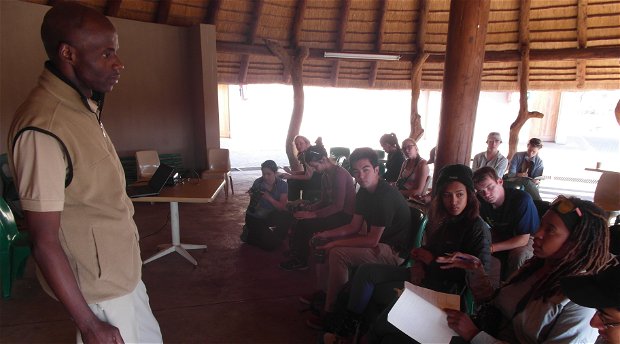Community ownership of Wilderness

Together with the Stanford University Seminar Participants we made time during our Safari to talk to Jerimiah Machavi, who works at the People and Conservation Department at Kruger National Park, Orpen Gate.
He works together with the surrounding communities to create a sense of ownership for the neighbouring wilderness. Jeremiah’s passion and determination to make a difference let him from choosing a career in Accountancy back to his ancestral lands joining the Kruger Park ranks. His vision is that worldwide communities around wilderness areas face similar challenges and have to be involved in conservation activities to develop ownership in order to safe-guard the land for sustainable use in the future to be enjoyed for many generations to come. Jerimiah pointed out the importance of learning from each success story weather it is in South-Africa or somewhere else in the world where communities are involved in actively conserving their neighbouring wilderness.
During the one and a half our presentation it was good to learn that Kruger Park is heavily investing in creating long-turn beneficial relationships for communities living along the South African border of the park. Unfortunately along the Mozambique border there are little initiatives and there is an enormous potential untapped for local communities to benefit from Tourism and other activities in the Park.
What stroke me is the confirmation that wilderness can only exist these days in a form where local communities have some sort of benefit from it. If we don’t organize and initiate the sense of ownership and allow sustainable usage of wilderness people will automatically go into unsustainable usage of the wild lands rendering valuable resources as unavailable for future generations; e.g; mining of minerals, illegal wood harvesting and intensive farming with irreversible burning practices or using tons of herbicides and pesticides to grow genetically modified crops.
In this light I would support the use of the sustainable use of plants and wildlife on these wild lands bringing in much needed income and jobs for local communities around the Kruger National Park. This means that wilderness and its animals and plants now become valuable for people around the park – creating a sense of ownership and pride- and they would think twice before they allow it to be destroyed. At this moment in time we are however far away from this as most of the people aliving around the Kruger National Park have not been inside the park in their life and have never seen a Lion or ever heard the call of the Ground Hornbill.






Share This Post